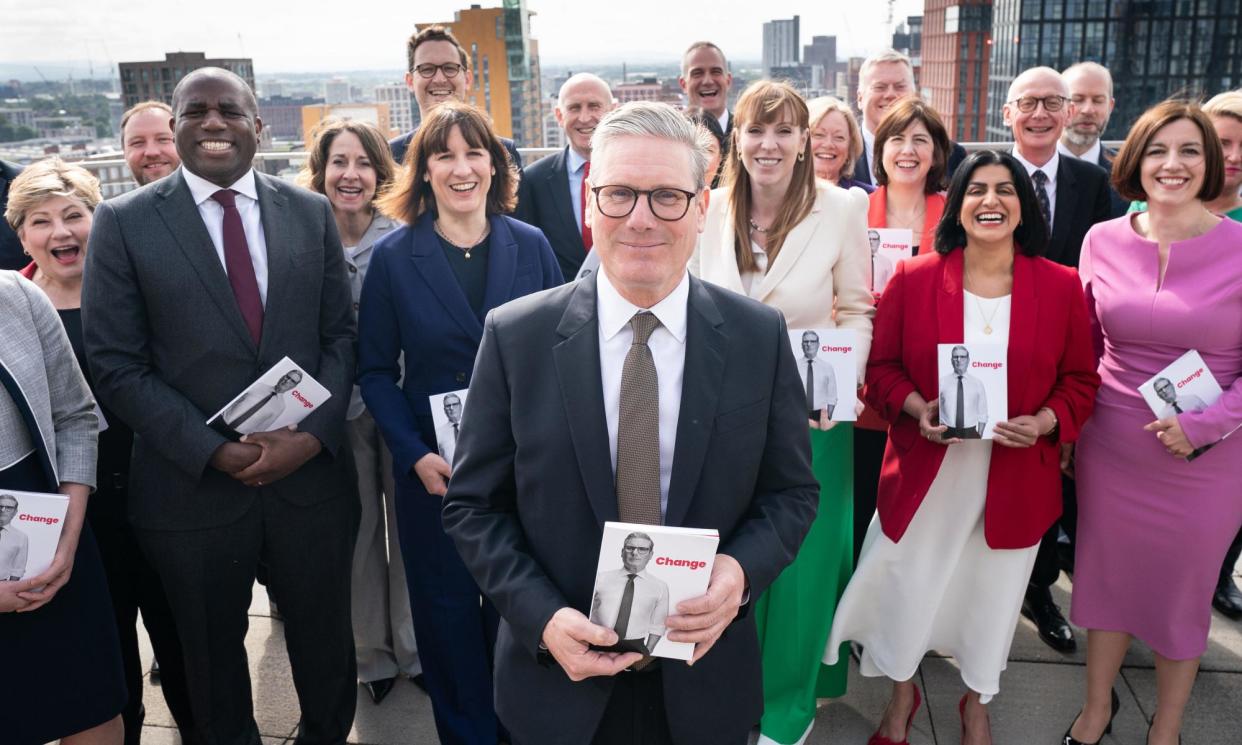Could the UK soon have the most working-class cabinet of all time?

One of the defining images of the Conservative era came before the election that brought it into being.
The infamous photo of David Cameron and Boris Johnson at Oxford University’s elitist Bullingdon Club emerged in 2007, 20 years after it was taken. Cameron’s “coalition of millionaires” was crammed with private school alumni, including the chancellor George Osborne, who wielded the austerity axe.
More recently, a majority of Rishi Sunak’s first cabinet were from private schools, according to figures published in 2022 by the Sutton Trust, a social mobility charity. Sunak and his wife Akshata Murty’s wealth is estimated at £651m.
But, by Friday morning, Britain could have its most state-educated cabinet in decades. The shadow cabinet heading into the general election is 77.5% state-educated, with seven out of 31 members having attended fee-paying schools.
State education tells a limited story about socio-economic class – state schools range from those in the poorest areas to selective grammars in wealthy ones. But many leading members of the shadow cabinet grew up in working-class households, some in deprivation. Jon Ashworth, the shadow paymaster general, said last week that the incoming cabinet “could possibly be the most working-class cabinet of all time”.
“All time” is a long time, and Ashworth’s suggestion that someone should “check this out” is made harder by the difficulties of defining socio-economic class. But there’s little doubt it will be both the most state-educated and working-class cabinet in decades, by background,and just as Cameron’s elite cabinet became indelibly linked to the austerity it enacted, some hope Labour’s more socially representative cabinet will have the opposite effect on the new government’s policies and priorities.
Lee Elliot Major, professor of social mobility at the University of Exeter and former head of the Sutton Trust, said: “When it comes to the cabinet, if you have a prime minister who comes from a very small slice of society, the danger is that they are less understanding, less empathetic of the daily challenges that we are facing, particularly now with rising poverty, child poverty, increasing inequalities.
“I believe that if we have a largely state-educated cabinet, it is more likely that they will be sympathetic to some of the social justice-type policies that people like me will be advocating.”
Shadow foreign secretary David Lammy echoed this last week when he criticised “a certain kind of public-school smallness” he witnessed among Conservatives. “They are not the class of people that Britain needs to run it now, and that’s what my own life story tells me,” he told the New Statesman.
But what use is a working-class cabinet led by the son of a toolmaker if its policies don’t match up? After 14 years during which homelessness has shot up and benefit claimants have been squeezed, Labour’s manifesto has little to say on social housebuilding nor reversing benefit cuts – most controversially, refusing to commit to scrapping the two-child limit on universal credit.
“I think they’re scared of a backlash, aren’t they?,” said Charlotte Hughes, a campaigner against poverty and benefits cuts, who is also active in her local Labour branch in Greater Manchester. “We’ve only got a week to go now, so they’re limited in what they can say themselves at the moment, but it would be great if any of them would say that we do plan on scrapping it or making alterations or something. It’s just wrong.”
“I know Labour are being very cautious and careful,” said Elliot Major. “But the hope, and I am optimistic about this, is that when and if they are in power, there will be a stronger commitment to social justice than perhaps we are seeing in the election at the moment.”
It’s not just about who is in the cabinet, but who it is consulting. “[Governments] are products of the advisers around those ministers, the civil servants around them,” said Elliot Major. “So what is really crucial, I think, is that when they’re seeking advice and opinions, they draw upon a genuinely diverse group of people in the inner sanctum of government.”
The shadow cabinet’s ranks may be from working-class backgrounds, but they have all achieved upward social mobility. Their recent experience of precarious work, benefit claims and mouldy housing will be from people turning up at their constituency surgeries.
“They’ve got more of an idea, more of a basis and a more realistic view on life, rather than the Tories’ ‘Everyone’s a scrounger’,” Hughes said. “I’m willing to give them a chance. That’s all we can do, isn’t it? Because what’s the alternative?”

 Yahoo News
Yahoo News 
